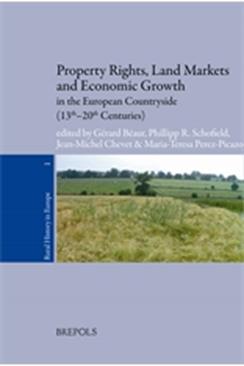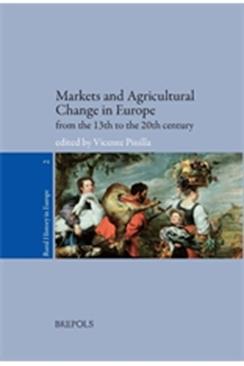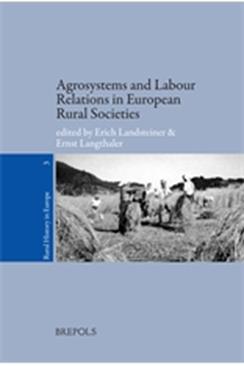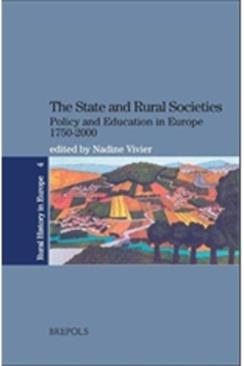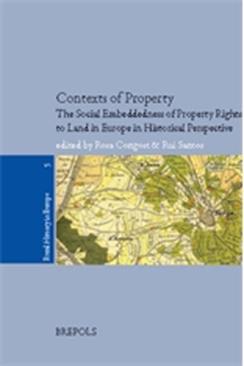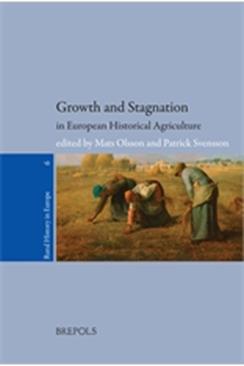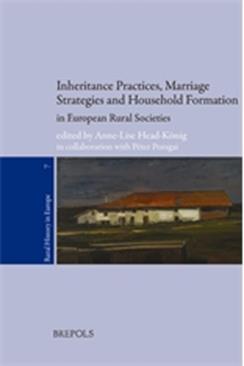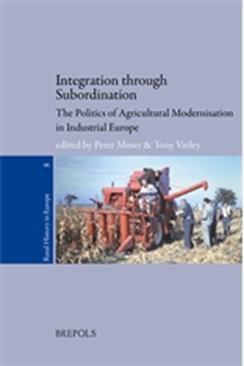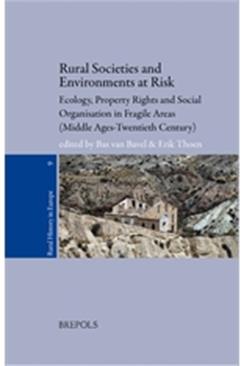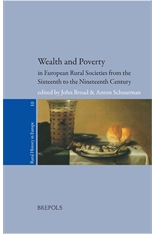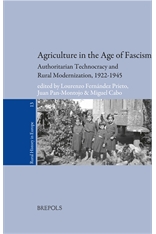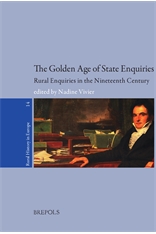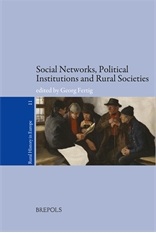Publications |
Rural History in Europe
Rubriques à consulter
Cost Editorial
COST
Action A 35 PROGRESSORE
COST - the acronym for European COoperation in the field of Scientific and Technical Research - is the oldest and widest European intergovernmental network for cooperation in research. Established by the Ministerial Conference in November 1971, COST is presently used by the scientific communities of 35 European countries to cooperate in common research projects supported by national funds. The funds provided by COST - less than 1% of the total value of the projects - support the COST cooperation networks (COST Actions) through which, with EUR 30 million per year, more than 30,000 European scientists are involved in research having a total value which exceeds EUR 2 billion per year. This is the financial worth of the European added value which COST achieves.
A 'bottom up approach' (the initiative of launching a COST Action comes from the European scientists themselves), á la carte participation (only countries interested in the Action participate), 'equality of access' (participation is open also to the scientific communities of countries not belonging to the European Union) and 'flexible structure' (easy implementation and light management of the research initiatives) are the main characteristics of COST (Web: www.cost.esf.org).
As precursor of advanced multidisciplinary research COST has a very important role for the realisation of the European Research Area (ERA) anticipating and complementing the activities of the Framework Programmes, constituting a 'bridge' towards the scientific communities of emerging countries, increasing the mobility of researchers across Europe and fostering the establishment of 'Networks of Excellence' in many key scientific domains such as: Biomedicine and Molecular Biosciences; Food and Agriculture; Forests, their Products and Services; Materials, Physical and Nanosciences; Chemistry and Molecular Sciences and Technologies; Earth System Science and Environmental Management; Information and Communication Technologies; Transport and Urban Development; Individuals, Societies, Cultures and Health. It covers basic and more applied research and also addresses issues of pre normative nature or of societal importance.
The Series Rural History in Europe
Sometimes viewed as the producer of foodstuffs and raw materials, as a garden or a space for the production of energy; sometimes seen as a reservoir of manpower destined to be subverted to the needs of cities and industries or as a peaceful haven which welcomes weary city-dwellers; also regarded as a places of easily incensed 'backward' societies or as an idyllic spot, close to nature where societies act as guardians of a certain conception of quality of life, the countryside has not ceased to be at the centre of economic, social, political, and now environmental, concern of governments and public opinion. Pulled between contradictory demands, the countryside of today presents an image of a place and a society in clear transformation, which, in itself, is difficult to decipher.
In Europe, the difficulty is that the countryside, which forms a complex and evolving universe, is experiencing ruptures and also exhibits inertias. These complex transformations of the rural world can only be fully understood if they are viewed in a manner which transcends national boundaries and if the discrepancies, which can only be observed by adopting a broad view, in fact at the continental scale, are taken into account. These changes cannot be explained without reference to their past. The question is how to create such a dialogue between researchers which goes beyond national boundaries, crosses chronological barriers and breaks disciplinary boundaries.
The main objective of the 'Rural History in Europe' collection is to provide just such keys to unlocking the changes experienced by present-day European rural societies in the light of their historical experience. It is to produce the historical knowledge which will allow us to conceptualise the future of European country-dwellers, as they face the kinds of problems which historians have grappled with in examining societies in the past: under-employment and multiple occupations, migrations and rural depopulation, distortion of competition by the marketplace or by the policies established by political authorities, competition with non-European producers, problems of resource allocation (land and water), distribution and redistribution of heritages and land-holding, the future of owner-occupied farms and the function of agriculture as employer, the tensions between private ownership and public access to land, the changes induced by settlement of urban migrants, environment and sustainable development, and so on.
In most European countries, rural society and long term change have been the subject of intensive research. Over the last half-century, a lively historiography has developed around questions concerning the factors of growth and systems of agricultural production, as well as the periodisation of growth and the impact of agriculture on industrial development. As a result, a body of knowledge has built up on techniques, forms of land-use, levels of production, the differing conditions and nature of the peasantry and the strategies of economic agents. More recently environmental concerns have made a dramatic impact on the consciousness of historians in the field, while previous findings have been questioned in a critical way and new perspectives have been drawn.
The field known as Rural History remains very much alive, despite the decline of the agricultural sector over the last several decades. Rural History remains fundamental in a Europe which has for so long been kept together by its Common Agricultural Policy and which now has to face the heavy impact of Brussels-based initiatives upon its rural regions, and an unprecedented revision of current agrarian systems and systems of production in the countries which have recently joined the EU. How can the changes taking place in present-day Europe be understood without taking into account a past which is still very present, and which determines both structures and behaviour?
The first volumes of this collection are the result of several workshops which have been held during the past three years and which have mainly been supported by funds of the European Action COST A 35 and by other institutions like CORN, GDR CNRS Sociétés Rurales Européennes, Universities... The COST Action, which was initiated three years ago, intends to extend the historical analysis of rural society over the last millenium in order to envisage the problems of the countryside in an extended timeframe and also to draw upon the commentary and expertise of specialists from other disciplines (sociology, economics, anthropology). This will enable the first real comparison of Europe from historians from all over the continent, from Scandinavia to the Mediterranean and from the western frontier to the eastern limits. Papers from these meetings will be published after a peer-review process, supported by the editorial board and, of course, the work of the authors and editors of the volumes. This collection will be constructed upon four main pillars: Landed property; The management of rural land; Peasant societies; The state, government, politics and peasants. Each of these will bring new perspectives and produce new tools to better understand the changes which axe taking place today. In order to ask the relevant questions about the future of these peasantries and rural spaces in transformation, the books of this collection will deal with the “longue durée” and will present either research in progress or a synthesis on a regional or national scale. The cumulative effect of this approach will be to produce volumes, the geographical coverage of which will be the whole of Europe.
The volumes will also, of course, take into account the role of history as an explanatory factor for contemporary European Societies. If rural societies have been overthrown, if rural landscapes have been profoundly transformed and if the intervention of the State has considerably strengthened the regulation of production and trade, the contrast between a contemporary rural world in rapid transformation and a traditional rural world with frozen landscapes, petrified societies, immobile economies and lethargic political contexts will be an illusion. It is important, therefore, to detect, to measure and to interpret the range of recent changes by illuminating those that have taken place in past centuries in a European context.
Sociétés Rurales Européennes Landed property; The management of rural land; Peasant societies; The state, government, politics and peasants. longue durée
http://www.brepols.net/Pages/BrowseBySeries.aspx?TreeSeries=RURHE
Editeur : Brepols publishers
 Actualités
Actualités
Forum de littérature médiévale comparée
 Conférence - Mercredi 24 avril 2024 - 18:00Le Forum de littérature médiévale comparée (Forum für mediävistische Komparatistik), site géré par Julia Rüthemann (post-doctorante au EHESS-CNRS, CRH, Université de Potsdam), Beatrice Trînca et Lea Braun, a le plaisir de vous inviter à sa troisième série de conférences en ligne au printemps 2024 !Ce Forum a pour but d’ouvrir un espace de discussion sur les approches comparatives en études médiévales et d’établir un réseau. Nous souhaitons regrouper(...)
Conférence - Mercredi 24 avril 2024 - 18:00Le Forum de littérature médiévale comparée (Forum für mediävistische Komparatistik), site géré par Julia Rüthemann (post-doctorante au EHESS-CNRS, CRH, Université de Potsdam), Beatrice Trînca et Lea Braun, a le plaisir de vous inviter à sa troisième série de conférences en ligne au printemps 2024 !Ce Forum a pour but d’ouvrir un espace de discussion sur les approches comparatives en études médiévales et d’établir un réseau. Nous souhaitons regrouper(...)
Lire l’État. Venise médiévale et ses territoires: représentations, cartographies, littératures
 Journée(s) d'étude - Lundi 29 avril 2024 - 09:00Ce Workshop est organisé par Christophe Austruy (EHESS-CNRS, CRH) et Giovanna Corazza (Università Ca’ Foscari - Venezia / University of Notre Dame, MSCA Fellow), dans le cadre de l’Atelier doctoral Histoire, Économie, Société et Culture dans l’Empire vénitien (Xe-XVIIIe siècle).Cet atelier s’articulera autour de recherches récentes sur les formes de représentations médiévales du territoire à travers le langage visuel de la cartographie et de ce(...)
Journée(s) d'étude - Lundi 29 avril 2024 - 09:00Ce Workshop est organisé par Christophe Austruy (EHESS-CNRS, CRH) et Giovanna Corazza (Università Ca’ Foscari - Venezia / University of Notre Dame, MSCA Fellow), dans le cadre de l’Atelier doctoral Histoire, Économie, Société et Culture dans l’Empire vénitien (Xe-XVIIIe siècle).Cet atelier s’articulera autour de recherches récentes sur les formes de représentations médiévales du territoire à travers le langage visuel de la cartographie et de ce(...)
Quantifier la Shoah. Classer, compter, modéliser / Quantifying the Holocaust. Classifying, Counting, Modeling
 Colloque - Mardi 14 mai 2024 - 08:45L'élaboration et la discussion des techniques d'enquête et d'analyse quantitatives percutent et renouvellent de nombreux champs de la recherche historique. Comment cela affecte-t-il les études sur la Shoah ? Ce colloque, oragisé par Claire Zalc (CNRS IHMC, EHESS, ERC Lubartworld), Robert Braun (UC Berkeley), Tal Bruttmann (Université de Cergy), Eva Kovacs, Institut Wiesenthal de Vienne pour les études sur l’Holocauste), Maël Le Noc (Mémorial de la Shoah, P(...)
Colloque - Mardi 14 mai 2024 - 08:45L'élaboration et la discussion des techniques d'enquête et d'analyse quantitatives percutent et renouvellent de nombreux champs de la recherche historique. Comment cela affecte-t-il les études sur la Shoah ? Ce colloque, oragisé par Claire Zalc (CNRS IHMC, EHESS, ERC Lubartworld), Robert Braun (UC Berkeley), Tal Bruttmann (Université de Cergy), Eva Kovacs, Institut Wiesenthal de Vienne pour les études sur l’Holocauste), Maël Le Noc (Mémorial de la Shoah, P(...)
ERHIMOR
EHESS-CRH
54 boulevard Raspail
75006 Paris
Tél. : +33 (0)1 49 54 24 42
ou : +33 (0)1 49 54 25 74
Fax : +33(0)1 49 54 23 99
Dernière modification :
18/04/2018

